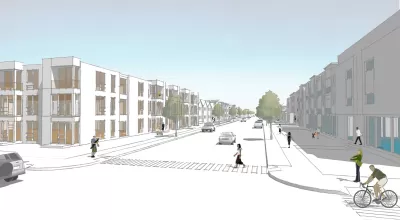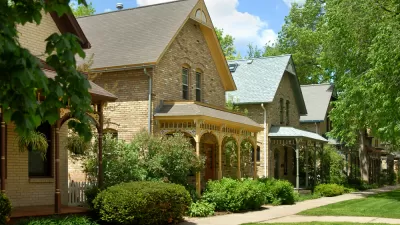A plan is only as good as its implementation, and so the Minneapolis 2040 Comprehensive Plan needs the right zoning code to achieve its lofty goals.

Janne Flisrand checks in with the landmark Minneapolis 2040 Comprehensive Plan, famous in planning circles for ending single-family zoning in the city—at least from a planning standpoint. The process of overhauling the city's zoning code to reflect that policy change and evaluating the effect of the change is still underway, and is facing new public scrutiny in the form of a Built Form Rezoning Study, open to the public through October 19.
Flisrand finds reason to believe that some of the suggestions up for consideration in the survey would fall short of the goals set by the plan [emphasis from the original]:
The Interior zone recommendations in the Built Form Rezoning Study do not implement the commitments made in the Minneapolis 2040 plan. They are a status quo recommendation. The status quo preserves our racial disparities, our worsening housing affordability, and makes it hard to achieve our climate mitigation goals.
Flisrand provides images to show each of the three recommendations, highlighting Interior 2 and 3 as status quo recommendations that "won’t allow us to build more homes that match the older pattern of development that shaped most of the neighborhoods."
But Flisrand does give positive reviews to the Corridor and Transit area recommendations. "They work for new construction, and the premium system is a smart way to incentivize what we as a city agreed we need in Minneapolis 2040," writes Flisrand.
The article includes a lot more detail about how the city developed these zoning tools intended to implement the vision laid out by the Minneapolis 2040 Comprehensive Plan, and calls for the city to start over with the proposed regulations. "This is an incredibly complex shift that we are taking on," writes Flisrand. "We must leave behind a prescriptive 1963 zoning code that imposed suburban values of homogeneity and too-big lots onto our historically diverse and affordable neighborhoods."
FULL STORY: Will Minneapolis 2040 Live Up to its Promise?

Alabama: Trump Terminates Settlements for Black Communities Harmed By Raw Sewage
Trump deemed the landmark civil rights agreement “illegal DEI and environmental justice policy.”

Study: Maui’s Plan to Convert Vacation Rentals to Long-Term Housing Could Cause Nearly $1 Billion Economic Loss
The plan would reduce visitor accommodation by 25% resulting in 1,900 jobs lost.

Planetizen Federal Action Tracker
A weekly monitor of how Trump’s orders and actions are impacting planners and planning in America.

Wind Energy on the Rise Despite Federal Policy Reversal
The Trump administration is revoking federal support for renewable energy, but demand for new projects continues unabated.

Passengers Flock to Caltrain After Electrification
The new electric trains are running faster and more reliably, leading to strong ridership growth on the Bay Area rail system.

Texas Churches Rally Behind ‘Yes in God’s Back Yard’ Legislation
Religious leaders want the state to reduce zoning regulations to streamline leasing church-owned land to housing developers.
Urban Design for Planners 1: Software Tools
This six-course series explores essential urban design concepts using open source software and equips planners with the tools they need to participate fully in the urban design process.
Planning for Universal Design
Learn the tools for implementing Universal Design in planning regulations.
Caltrans
Smith Gee Studio
Institute for Housing and Urban Development Studies (IHS)
City of Grandview
Harvard GSD Executive Education
Toledo-Lucas County Plan Commissions
Salt Lake City
NYU Wagner Graduate School of Public Service





























